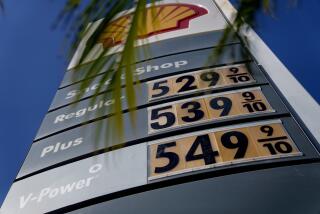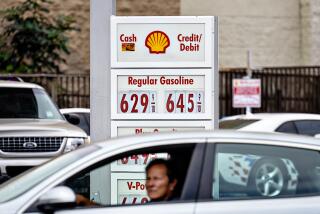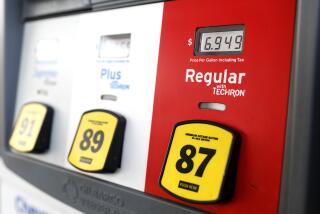Don’t base your car-buying decision on current gas prices, analysts warn
Buyers shifting their shopping to small, fuel-efficient vehicles because of high gas prices run the danger of making a long-term decision on a short-term price spike and finding themselves driving a car they don’t want, some analysts warn.
“It is like people who look out the window, see that it is raining and then think it is going to rain for the next four years,” said Jack Nerad, an analyst with auto information company Kelley Blue Book.
Though most oil watchers believe the cost of petroleum is on an ever-upward curve, the steepness of the climb is likely to be uneven, and it’s not clear whether prices will remain high if political turmoil in Arab oil-producing nations recedes.
“The prices of gasoline could collapse overnight if things settled down in the Middle East,” said Phil Flynn, an oil analyst with PFGBest Research in Chicago.
The problem is that no one can predict whether the revolution in Libya and unrest in neighboring nations will be limited or spread, disrupting oil supplies from Saudi Arabia and other Persian Gulf nations. That means gas and oil prices will remain high until commodities traders and petroleum buyers have a better sense of where the political situation is headed, Flynn said.
For now, there is significant spare petroleum capacity in Saudi Arabia and reserves in other major markets, “which could be very helpful in defraying a price-spike episode,” said Ellen Hughes-Cromwick, an economist at Ford Motor Co.
But with gas prices well into the $3-a-gallon range nationwide and hovering at $4 in California, consumers are starting to migrate to smaller cars. Ford’s tiny subcompact Fiesta sells best in California, where gas prices are among the highest in the nation.
The trend is reflected in Web traffic at auto information and pricing Internet sites.
At kbb.com, the web portal for Kelley Blue Book, searches for hybrids and electrics jumped 73% from the weekend of Feb. 19-20 to Feb. 26-27. Traffic to compact cars as a segment blossomed 46% in the same period.
“Among individual models, every compact car we tracked was up a minimum of 20% week-over-week, and the Ford Fiesta jumped 77%,” Nerad said.
Searches for fuel sippers such as the Hyundai Elantra, Ford Focus and Honda Accord each jumped more than 60%. On the hybrid/electric side, individual increases were even more dramatic, he said. The all-electric Nissan Leaf jumped 154%, while the Toyota Prius jumped 86%.
At least that’s how a segment of the population will react. Automakers believe people will continue to buy less fuel-efficient trucks and vehicles as long as they have some particular use or need and they have the money to put gas in the tank.
Aaron Pelcher, who works for an electric power company in Nevada, bought a Dodge Ram 1500 pickup truck in Las Vegas this week, replacing a Honda Accord that got about 25 miles per gallon.
“Not the best timing considering the gas prices.… I will only get the mid-to-upper teens in the truck. But we feel secure in our financial situation right now, and we wanted a truck,” Pelcher said.
His tows a camper for frequent family getaways and spends recreation time in the outdoors, hauling equipment that fits better in a truck.
For the week that ended Monday, the average price of a gallon of regular gasoline in the U.S. leaped to $3.383, up 19.4 cents from the previous week, the Energy Department said, as oil prices have moved higher on unrest in Libya and the Mideast. That was 68 cents higher than a year earlier, bringing the average to a record high for this time of the year but still well below the national record of $4.114 a gallon reached in July 2008.
In California, the average price climbed 16.4 cents to $3.719. That was 72 cents higher than the year-earlier price, and experts predicted that the state’s average would top $4 a gallon in the coming weeks.







